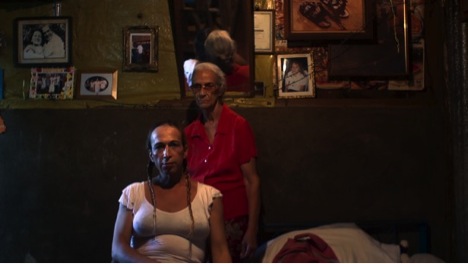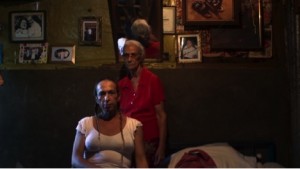El Hombre Nuevo (The New Man)

El Hombre Nuevo follows Nicaraguan born transvestite Stephania as she returns to her hometown, which she left as a child. Since then, contact with her family has been limited to spying on their Facebook pages.  At the beginning of the documentary she lingers on her father’s Facebook profile in an Internet café before deciding to add him. It is never revealed if he accepts the friend request.
At the beginning of the documentary she lingers on her father’s Facebook profile in an Internet café before deciding to add him. It is never revealed if he accepts the friend request.
Much of the documentary is shot in places that Stephania doesn’t personally occupy, such as Internet cafés, streets and other people’s houses. At the beginning of the film it is revealed that she has no stable home, so we never get an insight into any intimate spaces, which simultaneously adds to the profile of her character, while ensuring that we never get too close to her.
Shortly before Stephania returns to her hometown, she begins the process of legally becoming a woman. There is a sense that this scene is partly staged, and it feels somewhat inauthentic, simply convenient to the overarching narrative. As the government officials ask her how her parents reacted to the news of her gender change, a well-framed Stephania sits at a distance from the officials, who largely remain off camera: she seems to be fighting this battle alone.
The documentary is shot over 20 years and director Aldo Garay meshes old interview footage with current footage. We see how Stephania has evolved and developed, and also her sensitivity, which has not evaporated with time. Ultimately, the documentary is a character study, but there’s also a universal element as we witness the strangeness of Stephania, of her hometown and the people she grew up with.
It is hard not to like Stephania as a character as she tells us how to customise clothes, snipping the straps off a new t-shirt and pulling it above her midriff. She treats everyone she encounters with warmth and openness, but lingering close-ups to her perpetually made-up face reveal a vulnerability that her confident facade cannot hide.
The documentary’s shortcomings lie in its absences. As a viewer, one wants to know more about Stephania. She left Nicaragua at 12, with her brother remembering her brandishing a gun – another interesting insight into the politics of the time that is never fully explored. The documentary ends without resolution but then such is life: not all stray ends can be tied up and resolved.
Anna Paul
El Hombre Nuevo does not yet have a UK release date.
Read more of our reviews and interviews from the festival here.
For further information about Berlin Film Festival 2015 visit here.
Watch the trailer for El Hombre Nuevo here:
























Facebook
Twitter
Instagram
YouTube
RSS